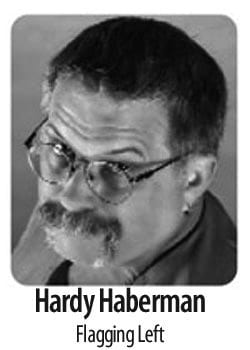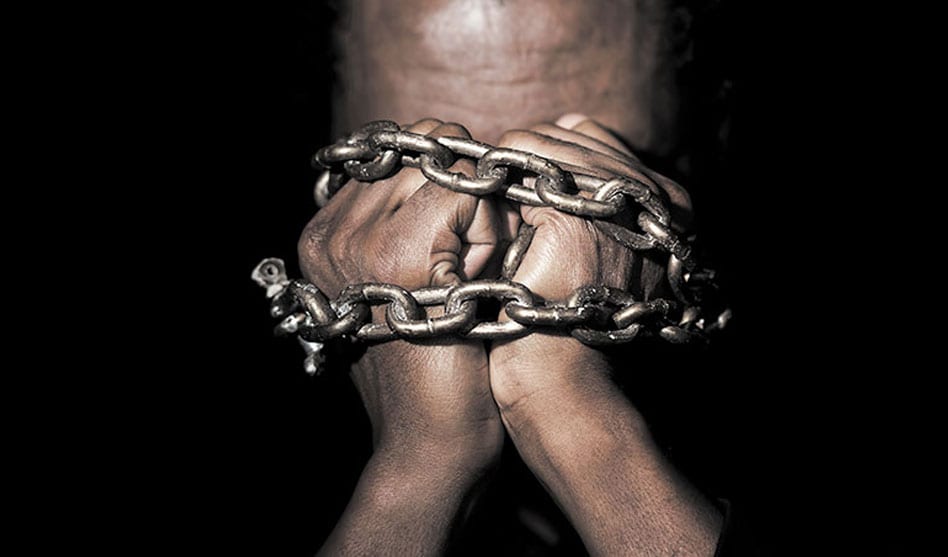
When I first saw a friend of mine from South Africa post something on Facebook about “slaves,” my mind immediately went to the kind I am familiar with: people who roleplay in their relationships as Master/slave. Some even have contracts between them detailing the terms of their “service.” It’s pretty mundane stuff in my leather/kink world.
Then I read the article my friend, Frank Malaba, had posted. Frank is a delightful guy, a poet and actor and is also an activist for human rights. But when I saw his “trigger warning” in the post, I realized he was speaking of actual “slavery,” in the worst possible sense.
Frank’s post included photos from a group of photojournalists calling themselves the Zambezi Reporters, the “Scribes of the Zambezi.” These pictures were beyond belief: Men shackled by their feet and hung in clusters like product on display; squalid rooms packed with human beings, in various states of health, being contained until they could be trafficked.
Accompanying stories indicate that these people are refugees fleeing various conflicts in sub-Saharan Africa that were captured by slave traders as they escaped conflict zones. They are sold into slavery as farm laborers in Libya at a price of $400-$500 each.
Recently, video of one of these slave auctions went viral, and the story of what is happening to these refugees leaked onto the world stage. Without the internet and social media, their horrific plight would still be a secret.
The sad story started as migrants were kidnapped and held for ransom. One migrant from Senagal told a member of the International Organization for Migration that he was told to call his family and demand cash for his release. When the family could not pay, he was moved to the southern Libyan city of Sabha and held with 100 other men, in a small room, until he was auctioned off to the highest bidder.
Those who were not sold or who could not pay for their own food were left to starve.
When I reposted this on my Facebook page, most people who read it were as horrified as me. But a few tried to compare the plight of these poor people to the idea of “wage slavery” and poverty in our country.
That’s where I lost it.
As a country with a history of slavery, of human beings being bought, sold and owned as property, Americans should be particularly sensitive to the inhumanity of this modern slave trade. To try to lessen the impact of what is an international human rights outrage with a pseudo-intellectual discussion of metaphoric economic concepts is inexcusable.
This is not scholarly theory; these are human beings, hung up like bunches of produce and bought and sold like bales of hay.
But my real outrage is reserved for our State Department. Just what are we doing to address this crisis? Where is the outrage from the Trump administration?
I can’t find any statement from our government on this slave trade situation. But it’s certainly easy to find the latest Trump rant on NFL players kneeling during the national anthem or gloating about his so-called “ratings.”
At a time when the U.S. should be taking its place on the world stage as a major force for good, we have instead become a bit actor, waiting in the wings for someone better and brighter to carry the day.
Our country’s former role as standard-bearer for human rights has been destroyed by a posturing, orange-haired, gibberish-speaking Pagliacci, a man who is a not-so-humorous distraction from the serious business at hand.
I am grateful I can use what little influence I have to make this story more visible. Just as life in the closet damages the well-being of LGBT people, hiding atrocities like this lets them fester and rot and grow out of control.
The closet is not a good place, for people or for news.
(My friend Frank Malaba’s blog with much of his poetry can be seen at FrankMalaba.blog. His resume and activism posts are online at FrankMalaba.com.)
Hardy Haberman is a longtime local LGBT activist and a board member of the Woodhull Freedom Alliance. His blog is at DungeonDiary.blogspot.com. He is also media director for gubernatorial candidate Jeffrey Payne.















